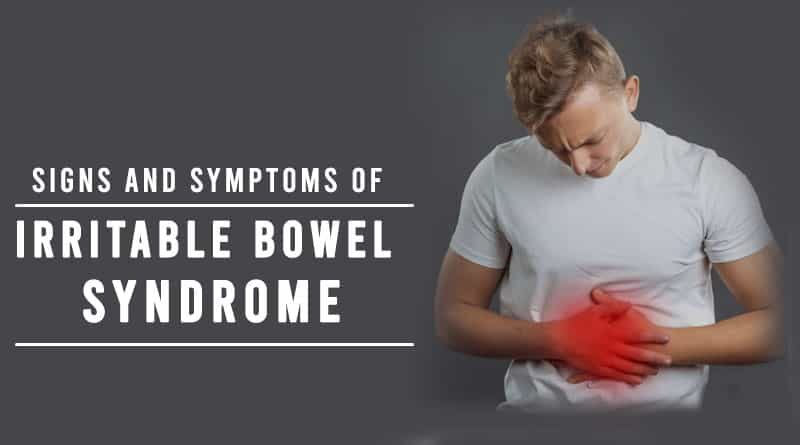9 Signs & Symptoms for IBS
Three to twenty percent of Americans experience IBS (Irritable Bowel Syndrome) symptoms and this condition more affects women when compared to men. However, some people experience minor symptoms but you should the signs and symptoms for IBS.
Table of Contents
What is IBS?
IBS is also known as irritable colon, spastic colitis, spastic colon, and mucous colitis. The group of intestinal symptoms occurs together know as IBS. The signs and symptoms vary in duration and severity from person to person.
In some cases, IBS may cause intestinal damage and it is not common. Irritable bowel syndrome does not increase the risk of gastrointestinal cancer but it can affect your life.
Symptoms for IBS
1. Excessive gas
People with IBS may lead to more gas production and experience excessive gas. The study, says that IBS caused by bacteria in a gut that creates toxins which may lead to excessive gas.
Another study says that people with IBS that gut able to less transport gas and feeling gassy than other normal people. It is one of the common symptoms for IBS.
Read: Unhealthy Gut Symptoms
2. Diarrhea
Diarrhea is one of the main symptoms for IBS. When gut muscles contact more than you need then it may lead to diarrhea.
As to produce nor bowel movement, the muscle in a gut contract and relax in a rhythmic way. But the people wi IBS, may slow down or speed up gu muscle contractions. So at a different time, IBS cause both diarrhea and constipation.
A study found a stool in the diarrhea-predominant type tends to be watery and loose and may also contain mucus.
3. Bloating
Excessive gas may also lead to bloating. A study found that people with IBS identify bloating is one of the nagging and persistent symptoms of the disorder.
The collection of gas in a gut and feel full. The abdomen appears rounder the usual.
Read: Foods to Reduce Bloating
4. Constipation
When the person cant pass stool normally then it may be constipation. A person with constipation may have(1):
- dry, hard, or lumpy stools
- Incomplete bowel movement
- Pain and difficult why passing stool
- fewer than 3 bowel movements a week
You can treat IBS by drinking more water, exercise, eating soluble fiber, limited use of laxatives, and taking probiotics may help.
Read: Foods for Constipation
5. Pain and cramps
Experiencing cramps and pain in the lower abdomen are two key symptoms for IBS. These symptoms may cause due to oversensitivity of the gut.
IBS affects the function of the brain and gut and the condition may cause the gut muscles to contract more than you need for a normal bowel movement.
This excessive contraction of a muscle in the gut may lead to pain and cramps.
6. Fatigue
A study found that over half of the people with IBS have fatigue. Feeling fatigued and tired is another common symptom of IBS.
IBS also related to insomnia, which includes waking frequently, difficulty falling asleep, and feeling unrested in the morning(3).
Read: Best Tea for Nausea
7. Feeling stressed
IBS and Stress are linked strongly. The symptoms for IBS may worsen when you feel stressed.
The physical symptoms for IBS may lead to psychological distress.
8. Food Intolerance
A study found that 70% of individuals with report IBS symptoms may trigger with particular foods.
People can reduce or prevent the symptoms for IBS by avoiding high-FODMAP foods, include:
- avocados
- garlic
- almonds
- onions
- lentils
- beans
- cashews
A study found that consuming a low-FODMAP diet may reduce or improve symptoms for IBS.
Read: Common Health Issues
9. Joint pain
Bloating and intestinal gas, are the symptoms for IBS are linked with brain fog(4). Foggy thinking or bran fog describes impaired judgement, mental confusion, and trouble concentrating.
More research needs to understand the link between gut problems and joint pain.
Bottom Line
If the individual now seeks treatment the IBS is a long-term health condition that may affect your life. Understanding the signs and symptoms for IBS may help the health condition. If you feel the condition becoming worsens then immediately make an appointment with a doctor.
Read: Intestine Facts
Reference
- https://www.ncbi.nlm.nih.gov/pmc/articles/PMC5622700/
- https://www.niddk.nih.gov/health-information/digestive-diseases/irritable-bowel-syndrome/definition-facts
- https://www.ncbi.nlm.nih.gov/pubmed/27021828
- https://adaa.org/understanding-anxiety/related-illnesses/irritable-bowel-syndrome-ibs
- https://www.ncbi.nlm.nih.gov/pmc/articles/PMC2933753/
- https://gut.bmj.com/content/48/1/14
- https://www.ncbi.nlm.nih.gov/pmc/articles/PMC6006167/
- https://nccih.nih.gov/health/digestive/IrritableBowelSyndrome.htm
- https://adaa.org/understanding-anxiety/related-illnesses/irritable-bowel-syndrome-ibs
- https://www.ncbi.nlm.nih.gov/pmc/articles/PMC5221272/
- https://www.niddk.nih.gov/health-information/digestive-diseases/constipation/definition-facts
- https://www.medicalnewstoday.com/articles/324259
Recommended Articles:




